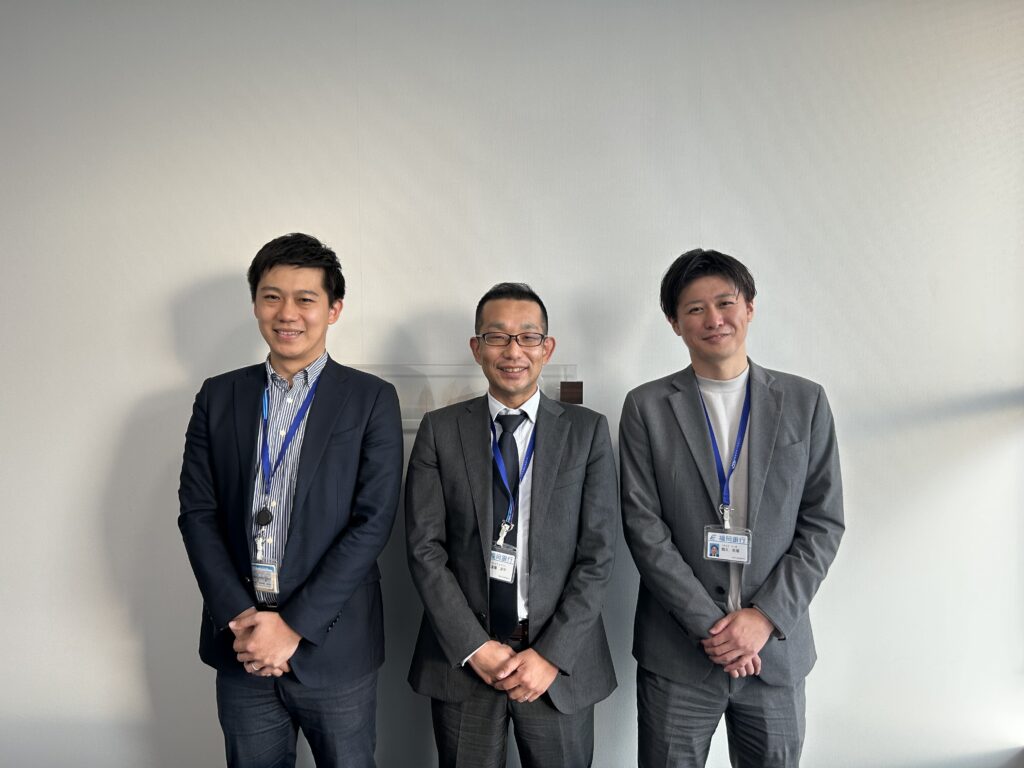
Fukuoka Bank (headquarters in Fukuoka City) conducts ship financing business as a bank under the Fukuoka Financial Group. As of the end of September 2023, the bank’s ship financing balance was 410 billion yen, up 40 billion yen from the end of the previous fiscal year, partly due to the positive effect of the weaker yen. We asked Yohei Endo, head of the company’s Specialty Finance Office, about the current status of the company. Takuma Tsuruku, Head of the Specialty Finance Department, and Yuta Nakano, Deputy Head of the Specialty Finance Department, also participated in the interview. (Interviewer: Hirofumi Yamamoto)
■A Unique Perspective
-The outstanding balance of loans for ships is growing.
“The weaker yen, which has remained at 145-150 yen to the dollar, has had a significant effect. The number of contracts is also increasing. Although bulk carriers are the main type of vessel, VLGC (liquefied petroleum gas) and product (petroleum product) carriers are also in the market. Although we have not clearly announced a policy to increase the loan balance itself, we will actively respond to projects that fit our lending perspective. As a result, the balance is on an increasing trend.”
-What is Fukuoka Bank’s ship financing policy?
“We aim to meet the needs for ship financing by considering both asset financing (loans that evaluate the value of the subject assets) and corporate financing (loans that use corporate value as the main source of financing). The principle is based on the shipowner’s enterprise value, the ship’s asset value and the charterer’s creditworthiness, which are evaluated comprehensively. On the other hand, there are some newer ship financing projects that do not meet the traditional criteria. These include shorter charter periods, soaring newbuilding prices and vessels that can handle new fuels. The number of project finance projects (a form of financing based on transportation contracts) is rather small. Fukuoka Bank is putting a certain amount of stress on the value of ships to test them and see if the companies can withstand it. In addition, we are examining the details of each charter contract more closely.”
-Newbuilding prices are skyrocketing.
“The shipyards are going ahead in 26-27 years. It is no secret that newbuilding prices are skyrocketing due to rising steel prices. So, whether we finance such newbuilding projects at all depends on the nature of the project. For example, even if the shipbuilder has not yet decided on a newbuilding site, some projects can be financed if the shipowner is strong and can allocate 10% to 30% of its own funds to the project.”
The majority of our charterers are overseas companies. Of course, in the case of overseas operators (ship operators), credit assessment by overseas operators is also necessary. Among the overseas operators, there are some operators specializing in dry cargo, tanker and gas shipping that are considered to have the same high creditworthiness as Japanese charterers. We would like to support not only projects for Japanese shipping companies, but also those that charter vessels from overseas operators.
■Participation through co-financing
-What about financing for LNG carriers?
“The price of new LNG vessels has reached a record high of $265 million, and it is difficult for a single regional bank to underwrite a single vessel from the standpoint of financing and economic rationality. We are participating in the LNG carrier project as a syndicated loan.”
What about co-financing with leasing companies?
“There are cases where leasing companies and Fukuoka Bank co-finance. What it means is that if a bank exercises a mortgage on a ship during a recession, it cannot wait for the market to recover. However, the leasing company can hold the ship. Even if the market deteriorates and the vessel is repossessed, the leasing company can wait for the market to rise if it holds the vessel. We consider the auction of the used ship that became collateral as a sale at a stage where the second-hand value of the ship has decreased ”
-Regional banks are expanding their operations in Singapore one by one. What about Fukuoka Bank?
“Fukuoka Bank has no concrete plans at present. We are a latecomer to the ship finance business compared to traditional banks, but we are continuing to expand our experience in ship finance by strengthening our staff from outside and sending them to outside companies in an environment where financing methods and approaches are changing with the times. Our challenge is how to develop and establish ship finance specialists as human resources. If we can do this, I believe we will be able to provide ship finance services from Fukuoka to the satisfaction of overseas operations and Japanese shipowners.”
■Brief Biography
(Yohei Endo)
Graduated from Keio University in 2002 and joined Fukuoka Bank. 44 years old.